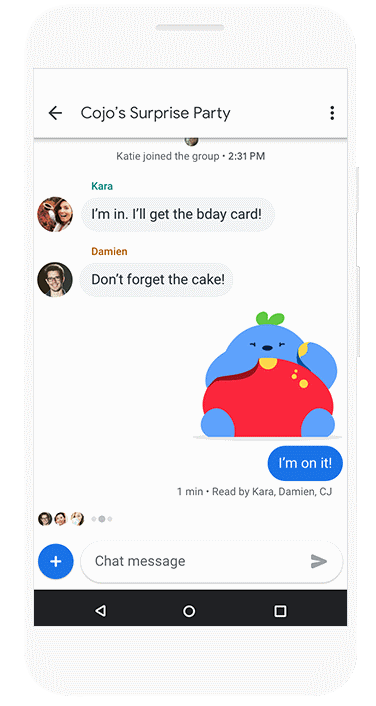Google has developed (or rather, acquired the technology along with a company called Jibe) a chat messaging system that is intended for mobile phones. In June 2019, Google opens the new service based on RCS (Rich Communication Service) technology in France and in the UK to the public. It is, however, difficult to see how this messaging system can succeed in the crowded market.
The history of RCS messaging originates from mobile network standards. To develop text messaging (SMS) and picture messaging (MMS) into a modern, live chat system, network operators agreed on a standard known as RCS. Operators, however, haven’t implemented it in their networks and on phones they market. After acquiring Jibe, Google had both the RCS server and client software that the company offered to operators. Still, networks were not keen to make RCS messaging available.
So, Google decided to launch RCS messaging on its own. Google is running the servers required for the service, and provides the messaging app for Android phones at the Google Play Store.
The first markets that will be able to chat and message using the Google RCS service are France and the UK in June 2019.
What is Google’s motivation to make yet another chat messaging system available for free?
Messaging is the most used online service. Email and other types of messaging services are – with a wide margin – the apps that make the internet tick for most people across the world.
So far, Google has failed multiple times in creating a messaging service that people would like to use so much that they would switch from WhatsApp, iMessage, or Facebook Messaging to Google. Ars Technica has counted that Google has introduced and withdrawn altogether nine messaging services before RCS. The corporation wants badly a piece of this action.
Google, of course, makes a vast majority of its revenue from advertising. For efficient advertising, the company collects personal data from the people who access its free services. The RCS messaging service is not an exception. Just like with Facebook Messaging, Google messaging service is more than likely to store private data from messages that pass through its servers.
Since it is a technology specifically designed for mobile networks, the RCS messaging app wants your phone number as well. If you haven’t surrendered your phone number to Google yet, you have to give it for accessing the chat service.
Another issue with Google’s free services is their incapability to understand that people travel. If you are in Mexico today, and tomorrow in Canada, Google services regard you as a hacker when you login to your account in a new location. Google’ behavior towards traveling people has changed from what it was a few years ago, and it is possible that some day the company gets it right.
Why is it so difficult to break through new messaging apps as mass market products?
Email, SMS text messages and MMS picture messages are universal standards. Everyone who has a device that can connect to a mobile network can send and receive these messages. Everyone knows that everyone else can communicate using these apps.
It took many years and massive marketing campaigns from WhatsApp to become a popular messaging app. The factor that slows down the adoption of any new messaging app is that you must know that the receiver happens to be using the same app as you.
Google RCS messaging must overcome the same adoption challenge as other messaging apps before it. Nothing guarantees it will happen. In addition, Google RCS is only available for Android phones at the moment, excluding Samsung devices.

